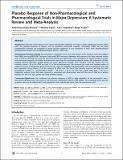| dc.contributor.author | Brunoni, André Russowsky | |
| dc.contributor.author | Lopes, Mariana | |
| dc.contributor.author | Kaptchuk, Ted Jack | |
| dc.contributor.author | Fregni, Felipe | |
| dc.date.accessioned | 2013-01-30T15:21:59Z | |
| dc.date.issued | 2009 | |
| dc.identifier.citation | Brunoni, André Russowsky, Mariana Lopes, Ted Jack Kaptchuk, and Felipe Fregni. 2009. Placebo response of non-pharmacological and pharmacological trials in major depression: A systematic review and meta-analysis. PLoS ONE 4(3): e4824. | en_US |
| dc.identifier.issn | 1932-6203 | en_US |
| dc.identifier.uri | http://nrs.harvard.edu/urn-3:HUL.InstRepos:10246811 | |
| dc.description.abstract | Background: Although meta-analyses have shown that placebo responses are large in Major Depressive Disorder (MDD) trials; the placebo response of devices such as repetitive transcranial magnetic stimulation (rTMS) has not been systematically assessed. We proposed to assess placebo responses in two categories of MDD trials: pharmacological (antidepressant drugs) and non-pharmacological (device- rTMS) trials. Methodology/Principal Findings: We performed a systematic review and meta-analysis of the literature from April 2002 to April 2008, searching MEDLINE, Cochrane, Scielo and CRISP electronic databases and reference lists from retrieved studies and conference abstracts. We used the keywords placebo and depression and escitalopram for pharmacological studies; and transcranial magnetic stimulation and depression and sham for non-pharmacological studies. All randomized, double-blinded, placebo-controlled, parallel articles on major depressive disorder were included. Forty-one studies met our inclusion criteria - 29 in the rTMS arm and 12 in the escitalopram arm. We extracted the mean and standard values of depression scores in the placebo group of each study. Then, we calculated the pooled effect size for escitalopram and rTMS arm separately, using Cohen's d as the measure of effect size. We found that placebo response are large for both escitalopram (Cohen's d - random-effects model - 1.48; 95%C.I. 1.26 to 1.6) and rTMS studies (0.82; 95%C.I. 0.63 to 1). Exploratory analyses show that sham response is associated with refractoriness and with the use of rTMS as an add-on therapy, but not with age, gender and sham method utilized. Conclusions/Significance: We confirmed that placebo response in MDD is large regardless of the intervention and is associated with depression refractoriness and treatment combination (add-on rTMS studies). The magnitude of the placebo response seems to be related with study population and study design rather than the intervention itself. | en_US |
| dc.language.iso | en_US | en_US |
| dc.publisher | Public Library of Science | en_US |
| dc.relation.isversionof | doi:10.1371/journal.pone.0004824 | en_US |
| dc.relation.hasversion | http://www.ncbi.nlm.nih.gov/pmc/articles/PMC2653635/pdf/ | en_US |
| dash.license | LAA | |
| dc.title | Placebo Response of Non-Pharmacological and Pharmacological Trials in Major Depression: A Systematic Review and Meta-Analysis | en_US |
| dc.type | Journal Article | en_US |
| dc.description.version | Version of Record | en_US |
| dc.relation.journal | PLoS ONE | en_US |
| dash.depositing.author | Kaptchuk, Ted Jack | |
| dc.date.available | 2013-01-30T15:21:59Z | |
| dash.affiliation.other | HMS^Global Health and Social Medicine | en_US |
| dash.affiliation.other | HMS^Medicine- Beth Israel-Deaconess | en_US |
| dash.affiliation.other | HMS^Neurology- Beth Israel-Deaconess | en_US |
| dc.identifier.doi | 10.1371/journal.pone.0004824 | * |
| dash.contributor.affiliated | Fregni, Felipe | |
| dash.contributor.affiliated | Kaptchuk, Ted | |


